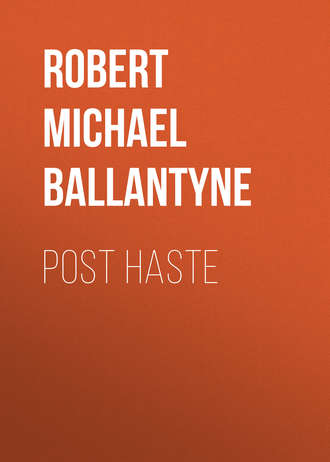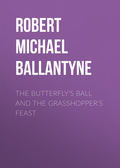
Robert Michael Ballantyne
Post Haste
Chapter Twenty One.
Tells of a Series of Terrible Surprises
“Well, what did you think of that, old girl?” asked Peter Pax of Tottie, on issuing from the Literary Message-Boys’ Hall, after having performed his duties there.
“It was wonderful. I ’ad no idear that the Post-Office was so old or so grand a’ institootion—But please don’t forget father,” said Tottie, with an anxious look at the battered clock.
“I don’t forget ’im, Tot. I’ve been thinkin’ about ’im the whole time, an’ I’ve made up my mind what to do. The only thing I ain’t sure of is whether I shouldn’t take my friend Phil Maylands into partnership.”
“Oh, please, don’t,” pleaded Tottie; “I shouldn’t like ’im to know about father.”
“Well, the less he knows about ’im the better. P’r’aps you’re right. I’ll do it alone, so you cut away home. I’ll go to have my personal appearance improved, and then off to Charing Cross. Lots of time, Tottie. Don’t be anxious. Try if you can trust me. I’m small, no doubt, but I’m tough.—Good-night.”
When Abel Bones seated himself that night in a third-class carriage at Charing Cross, and placed a neat little black hand-bag, in which he carried his housebreaking tools, on the floor between his feet, a small negro boy entered the carriage behind him, and, sitting down directly opposite, stared at him as if lost in unutterable amazement.
Mr Bones took no notice of the boy at first, but became annoyed at last by the pertinacity of his attention.
“Well, you chunk of ebony,” he said, “how much are you paid a week for starin’?”
“No pound no shillin’s an’ nopence, massa, and find myself,” replied the negro so promptly that Bones smiled in spite of himself. Being, however, in no mood for conversation, he looked out at the carriage window and let the boy stare to his heart’s content.
On drawing up to the platform of the station for Rosebud Cottage, Mr Bones seemed to become anxious, stretched his head out at the carriage window, and muttered to himself. On getting out, he looked round with a disappointed air.
“Failed me!” he growled, with an anathema on some one unknown. “Well, I’ll do it alone,” he muttered, between his teeth.
“O no! you won’t, my fine fellow,” thought the negro boy; “I’ll help you to do it, and make you do it badly, if you do it at all.—May I carry your bag, massa?” he added, aloud.
Mr Bones replied with a savage kick, which the boy eluded nimbly, and ran with a look of mock horror behind a railway van. Here he put both hands to his sides, and indulged in a chuckle so hearty—though subdued—that an ordinary cat, to say nothing of a Cheshire one, might have joined him from sheer sympathy.
“O the brute!” he gasped, on partially recovering, “and Tottie!—Tottie!! why she’s—” Again this eccentric boy went off into subdued convulsions, in which state he was discovered by a porter, and chased off the premises.
During the remainder of that night the “chunk of ebony” followed Mr Bones like his shadow. When he went down to the small public-house of the hamlet to moisten his throat with a glass of beer, the negro boy waited for him behind a hay-stack; when he left the public-house, and took his way towards Rosebud Cottage, the boy walked a little behind him—not far behind, for the night was dark. When, on consulting his watch, with the aid of a match, Bones found that his time for action had not arrived and sat down by the side of a hedge to meditate, the chunk crept through a hole in the same hedge, crawled close up like a panther, lay down in the grass on the other side, and listened. But he heard nothing, for the burglar kept his thoughts, whatever they might have been, to himself. The hour was too still, the night too dark, the scene too ghostly for mutterings. Peering through the hedge, which was high and thick, the boy could see the red glow of Mr Bones’s pipe.
Suddenly it occurred to Pax that now was a favourable opportunity to test his plan. The hedge between him and his victim was impassable to any one larger than himself; on his side the ground sloped towards a plantation, in which he could easily find refuge if necessary. There was no wind. Not a leaf stirred. The silence was profound—broken only by the puffing of the burglar’s lips. Little Pax was quick to conceive and act. Suddenly he opened his mouth to its widest, took aim where he thought the ear of Bones must be, and uttered a short, sharp, appalling yell, compared to which a shriek of martyrdom must have been as nothing.
That the effect on Bones was tremendous was evinced by the squib-like action of his pipe, as it flew into the air, and the stumbling clatter of his feet, as he rushed blindly from the spot. Little Pax rolled on the grass in indescribable ecstasies for a few seconds, then crept through the hole, and followed his victim.
But Bones was no coward. He had only been taken by surprise, and soon stopped. Still, he was sufficiently superstitious to look frequently over his shoulder as he walked in the direction of Miss Stivergill’s Cottage.
Pax was by that time on familiar ground. Fearing that Bones was not to be scared from his purpose by one fright, he made a détour, got ahead of him, and prepared to receive him near the old well of an adjoining farm, which stood close by the road. When the burglar’s footsteps became audible, he braced himself up. As Bones drew near Pax almost burst his little chest with an inhalation. When Bones was within three feet of him, he gave vent to such a skirl that the burglar’s reason was again upset. He bounded away, but suddenly recovered self-possession, and, turning round, dashed at the old well, where Pax had prematurely begun to enjoy himself.
To jump to his feet and run like the wind was the work of a moment. Bones followed furiously. Rage lent him for the moment unwonted power. He kept well up for some distance, growling fiercely as he ran, but the lithe limbs and sound lungs of the boy were too much for him. He soon fell behind, and finally stopped, while Pax ran on until out of breath.
Believing that he had now rid himself of some mischievous boy of the neighbourhood, the burglar turned back to transact his business at Rosebud Cottage.
Peter Pax also turned in the same direction. He felt that things were now beginning to look serious. To thwart Mr Bones in his little game by giving information as to his intentions, would have been easy, but then that would have involved his being “took,” which was not to be thought of. At the same time, it was evident that he was no longer to be scared by yells.
Somewhat depressed by his failure, Pax hastened towards the cottage as fast as he could, resolved to give his enemy a last stunning reception in the garden, even although, by so doing, he would probably scare Miss Stivergill and her household out of their wits.
He reached the garden some minutes before Bones, and clambered over the wall. While in the very act of doing so, he felt himself seized by the throat and nearly strangled.
“Now then, young ’un,” growled a deep voice, which was not that of Bones, “what little game may you be up to?”
“Ease your grip and I’ll tell you,” gasped Pax.
It was the constable of the district who had caught him. That faithful guardian of the night, having been roused by the unwonted yells, and having heard Pax’s footsteps, had followed him up.
“I’m not a burglar, sir,” pleaded Pax, not well knowing what to say. Suddenly he opened his mouth in desperation, intending to give one final yell, which might scare Bones from his impending fate, but it was nipped in the bud by the policeman’s strong hand.
“Ha! you’d give your pal a signal, would you?” he said, in a gruff whisper. “Come now, keep quiet if you don’t want to be choked. You can’t save ’im, so you’d better give in.”
Poor Pax now saw that nothing more could be done. He therefore made a virtue of necessity, and revealed as much of the object of his mission as he deemed prudent. The man believed him, and, on his promising to keep perfectly still, released him from his deadly grip.
While the policeman and the boy lay thus biding their time in the shrubbery, Bones got over the wall and quietly inspected the premises.
“I’ll let him begin, and take him in the act,” whispered the policeman.
“But he’s an awful big, strong, determined feller,” said Pax.
“So am I,” returned the policeman, with a smile, which was lost in the dark.
Now it so happened that Miss Lillycrop, who had been spending that day with Miss Stivergill, had been induced to spend the night also with her friend. Of course these two had much to talk about—ladies generally have in such circumstances—and they were later than usual in going to bed. Mr Bones was therefore, much against his will, obliged to delay the execution of his plans. Little dreaming that two admirers lay in ambush about fifty yards off, he retired to a dark corner behind a bit of old wall, and there, appropriately screened by a laurel bush, lit his pipe and enjoyed himself.
“My dear,” said Miss Stivergill to her friend about midnight, “we must go to bed. Do you go up to my room; I’ll follow after looking round.”
It was the nightly practice of this lady to go over her premises from cellar to garret, to make quite sure that the servant had fastened every bolt and bar and lock. She began with the cellars. Finding everything right there, she went to the dining-room windows.
“Ha! the gipsy!—unbolted, and the shutters open!” exclaimed Miss Stivergill, fastening the bolt.
“H’m! The old fool,” thought the burglar, observing her tall square figure while thus engaged, “might as well bolt the door of Newgate with a steel pen. Cottage window-gear is meant for show, not for service, old girl.”
“I look round regularly every night,” observed Miss Stivergill, entering her bedroom, in which Miss Lillycrop usually occupied a chair bed when on a visit to The Rosebud. “You’ve no idea how careless servants are (‘Haven’t I, just?’ thought her friend), and although I have no personal fear of burglars, I deem it advisable to interpose some impediments to their entrance.”
“But what would you do if they did get in?” asked Miss Lillycrop, in some anxiety, for she had a very strong personal fear of burglars.
“Oh! I have several little plans for their reception,” replied the lady, with a quiet smile. There’s a bell in the corner there, which was meant for the parish church, but was thought to be a little too small. I bought it, had a handle affixed to it, as you see, and should ring it at an open window if the house were attempted.
“But they might rush in at the door and stop you—kill you even!” suggested the other, with a shudder.
“Have you not observed,” said Miss Stivergill, “that I lock my door on the inside? Besides, I have other little appliances which I shall explain to you in the morning, for I scorn to be dependent on a man-servant for protection. There’s a revolver in that drawer beside you”—Miss Lillycrop shrank from the drawer in question—“but I would only use it in the last extremity, for I am not fond of taking human life. Indeed, I would decline to do so even to save my own, but I should have no objection to maim. Injuries about the legs or feet might do burglars spiritual as well as physical good in the long-run, besides being beneficial to society.—Now, my dear, good-night.”
Miss Stivergill extinguished the candle as violently as she would have maimed a burglar, and poor Miss Lillycrop’s heart leapt as she was suddenly plunged into total darkness—for she was naturally timid, and could not help it.
For some time both ladies lay perfectly still; the hostess enjoying that placid period which precedes slumber; the guest quaking with fear caused by the thoughts that the recent conversation had raised.
Presently Miss Lillycrop raised herself on one elbow, and glared in the direction of her friend’s bed so awfully that her eyes all but shone in the dark.
“Did you hear that, dear?” she asked, in a low whisper.
“Of course I did,” replied Miss Stivergill aloud. “Hush! listen.”
They listened and heard “that” again. There could be no doubt about it—a curious scratching sound at the dining-room window immediately below theirs.
“Rats,” said Miss Stivergill in a low voice.
“Oh! I do hope so,” whispered Miss Lillycrop. She entertained an inexpressible loathing of rats, but compared with burglars they were as bosom friends whom she would have welcomed with a glad shudder.
In a few minutes the scratching ceased and a bolt or spring snapped. The wildest of rats never made a sound like that! Miss Lillycrop sat bolt up in her bed, transfixed with horror, and could dimly see her friend spring from her couch and dart across the room like a ghostly phantom.
“Lilly, if you scream,” said Miss Stivergill, in a voice so low and stern that it caused her blood to curdle, “I’ll do something awful to you.—Get up!”
The command was peremptory. Miss Lillycrop obeyed.
“Here, catch hold of the bell-handle—so. Your other hand—there—keep the tongue fast in it, and don’t ring till I give the word.”
Miss Lillycrop was perfect in her docility.
A large tin tea-tray hung at the side of Miss Stivergill’s bed. Beside it was a round ball with a handle to it. Miss Lillycrop had wondered what these were there for. She soon found out.
Miss Stivergill put the dressing-table a little to one side, and placed a ewer of water on it.
At that moment the dining-room window was heard to open slowly but distinctly.
Miss Stivergill threw up the bedroom window.
The marrow in Miss Lillycrop’s spine froze.
Mr Bones started and looked up in surprise. He received a deluge of water on his face, and at the same moment a ewer burst in atoms on the gravel at his feet—for Miss Stivergill did nothing by halves. But Bones was surprise-proof by that time; besides, the coveted treasure was on the sideboard—almost within his grasp. He was too bold a villain to be frightened by women, and he knew that sleeping country-folk are not quickly roused to succour the inmates of a lonely cottage. Darting into the room, he tumbled over chairs, tables, work-boxes, fire-irons, and coal-scuttle.
“Ring!” said Miss Stivergill sharply. At the same moment she seized the tea-tray in her left hand and belaboured it furiously with the drumstick.
“Ring out at the window!” shouted Miss Stivergill.
Miss Lillycrop did so until her spinal marrow thawed.
The noise was worse than appalling. Little Pax, unable to express his conflicting emotions in any other way, yelled with agonising delight. Even the hardened spirit of Bones trembled with mingled feelings of alarm and surprise. He found and grasped the coveted box, and leaped out of the window with a bound. It is highly probable that he would have got clear off but for the involuntary action of Miss Lillycrop. As that lady’s marrow waxed warm she dashed the great bell against the window-sill with such fervour that it flew from her grasp and descended full on the burglar’s cranium, just as he leaped into the arms of the policeman, and both fell heavily to the ground. The guardian of the night immediately jumped up uninjured, but Bones lay prone on the green sward—stunned by the bell.
“That’s well done, anyhow, an’ saved me a world o’ trouble,” said the constable, looking up at the window as he held the burglar down, though there was little necessity for that. “You couldn’t shy me over a bit of rope, could you, ma’am?”
Miss Stivergill, to whom nothing seemed difficult, and who had by that time stopped her share in the noise, went into a cupboard and fetched thence a coil of rope.
“I meant it to be used in the event of fire,” she said quietly to her friend, who had thrown herself flat on her bed, “but it will serve other purposes as well.—There, policeman.”
She threw it down, and when Bones recovered consciousness he found himself securely tied and seated in a chair in the Rosebud kitchen—the policeman looking at him with interest, and the domestics with alarm. Miss Stivergill regarded him with calm severity.
“Now he’s quite safe, ma’am, but I can’t venture to take ’im to the station alone. If you’ll kindly consent to keep an eye on him, ma’am, till I run down for a comrade, I’ll be greatly obleeged. There’s no fear of his wrigglin’ out o’ that, ma’am; you may make your mind easy.”
“My mind is quite easy, policeman; you may go. I shall watch him.”
When the man had left, Miss Stivergill ordered the servants to leave the kitchen. Little Pax, who had discreetly kept out of range of the burglar’s eye, went with them, a good deal depressed in spirit, for his mission had failed. The burglary had not indeed, been accomplished, but—“father” was “took.”
When Miss Stivergill was left alone with the burglar she gazed at him for some time in silence.
“Man,” she said at length, “you are little Bones’s father.”
“If you means Tottie, ma’am, I is,” replied Bones, with a look and tone which were not amiable.
“I have a strong feeling of regard for your child, though not a scrap of pity for yourself,” said Miss Stivergill, with a frown.
Mr Bones muttered something to the effect that he returned the compliment with interest.
“For Tottie’s sake I should be sorry to see you transported,” continued the lady, “therefore I mean to let you off. Moreover, bad as you are, I believe you are not so bad as many people would think you. Therefore I’m going to trust you.”
Bones looked inquiringly and with some suspicion at his captor. He evidently thought there was a touch of insanity about her. This was confirmed when Miss Stivergill, seizing a carving-knife from the dresser, advanced with masculine strides towards him. He made a desperate effort to burst his bonds, but they were too scientifically arranged for that. “Don’t fear,” said the lady, severing the cord that bound the burglar’s wrists, and putting the knife in his hands. “Now,” she added, “you know how to cut yourself free, no doubt.”
“Well, you are a trump!” exclaimed Bones, rapidly touching his bonds at salient points with the keen edge.
In a few seconds he was free.
“Now, go away,” said Miss Stivergill, “and don’t let me see you here again.”
Bones looked with admiration at his deliverer, but could only find words to repeat that she was a trump, and vanished through the back-door, just as a band of men, with pitchforks, rakes, spades, and lanterns, came clamouring in at the front garden gate from the neighbouring farm.
“What is it?” exclaimed the farmer.
“Only a burglar,” answered Miss Stivergill.
“Where is he?” chorussed everybody.
“That’s best known to himself,” replied the lady, who, in order to give the fugitive time, went into a minute and slow account of the whole affair—excepting, of course, her connivance at the escape—to the great edification of her audience, among whom the one who seemed to derive the chief enjoyment was a black boy. He endeavoured to screen himself behind the labourers, and was obviously unable to restrain his glee.
“But what’s come of ’im, ma’am?” asked the farmer impatiently.
“Escaped!” answered Miss Stivergill.
“Escaped!” echoed everybody, looking furtively round, as though they supposed he had only escaped under the dresser or into the keyhole.
“Escaped!” repeated the policeman, who entered at the moment with two comrades; “impossible! I tied ’im so that no efforts of his own could avail ’im. Somebody must ’ave ’elped ’im.”
“The carving-knife helped him,” said Miss Stivergill, with a look of dignity.—“Perhaps, instead of speculating how he escaped, policeman, it would be better to pursue him. He can’t be very far off, as it is not twenty minutes since he cut himself free.”
In a state of utter bewilderment the policeman rushed out of the cottage, followed by his comrades and the agriculturists. Peter Pax essayed to go with them, but was restrained by an iron grip on his collar. Pulling him back, Miss Stivergill dragged her captive into a parlour and shut the door.
“Come now, little Pax,” she said, setting the boy in a chair in front of her, “you needn’t try to deceive me. I’d know you among a thousand in any disguise. If you were to blacken your face with coal-tar an inch thick your impertinence would shine through. You know that the burglar is little Bones’s father; you’ve a pretty good guess that I let him off. You have come here for some purpose in connection with him. Come—out with it, and make a clean breast.”
Little Pax did make a clean breast then and there, was washed white, supped and slept at The Rosebud, returned to town next day by the first train, and had soon the pleasure of informing Tottie that the intended burglary had been frustrated, and that her father wasn’t “took” after all.







